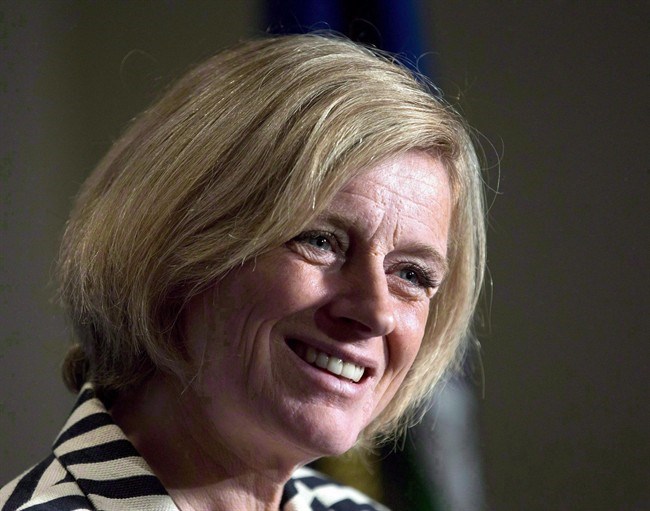 “Projects like pipelines shouldn’t pit one province against another — they should stimulate conversations that recognize the economic needs and positions of all provinces,” Alberta Premier Rachel Notley told the National Energy Board Tuesday.
“Projects like pipelines shouldn’t pit one province against another — they should stimulate conversations that recognize the economic needs and positions of all provinces,” Alberta Premier Rachel Notley told the National Energy Board Tuesday.
She personally signed the province’s final written submission on Kinder Morgan’s Trans Mountain pipeline expansion plan.
The difference in tone between Alberta’s critique and B.C.’s is about what you’d expect. The B.C. stance — urging rejection of the current plan because safety concerns haven’t been addressed — was filed a day earlier and got a lot more attention.
Alberta’s review is a big-picture economic argument that stresses the positives of the pipeline. Notley said improved market access for Alberta oil “will substantially increase corporate income taxes, benefiting all of Canada.
“This important pipeline infrastructure will support an integrated energy economy in Canada that will be more attractive to investors, which in turn will generate more economic activity Canada-wide.”
Some people object to the line because it would perpetuate oilsands extraction. Notley turns that argument on its head. “Accessing fair value for our resources will also allow Albertans to continue to make important investments for greening our development and transitioning to a low-carbon economy.”
She said Alberta understands that to grow the energy infrastructure, “we need to continue to improve our environmental record and reputation.” So the new climate-leadership plan demonstrates that a forward-thinking energy-producing jurisdiction can also be a world leader in the fight against climate change.
Notley said bitumen will soon be produced with lower emissions than currently. And oilsands production is expected to grow, so the province is interested in all viable projects that can safely and economically move oil and gas to markets.
“Alberta urges the board to place substantial weight on all of Trans Mountain’s filed economic need and benefit evidence,” she says.
That evidence suggests a $73-billion hike in crude oil revenues over 20 years if the pipeline proceeds. It calculates 123,000 person-years of high-value employment and a $28-billion hike in government revenues.
All those benefits stem from getting a higher price for the oil, by moving it to tidewater so it can be shipped overseas to higher-value markets. Western Canada’s undervalued oil price, because of limited market access, is having an impact on the national economy, she said.
Canadian oil is exported almost exclusively now to fully served or difficult-to-access markets in the U.S., resulting in significant discounting of the price.
“Alberta submits that it is imperative to the overall Canadian public interest that Canada’s crude oil markets diversify beyond the current dependence on the U.S. refining markets,” Notley says.
It’s more than just benefits accruing from the pipeline, the brief says. The lack of a pipeline is a sizable net loss. “Alberta submits that the loss from price discounting is of such size and persistence that it cannot be in the Canadian public interest.”
And whatever the concerns about the oilsands, Notley said production is only going to go up in the future. She urged the NEB to declare the pipeline benefits are “clear, substantial and undeniable.”
There will be an ample supply of crude and there are attractive, premium overseas markets that will pay top dollar for it, to the enormous benefit of Alberta and the country.
So the two key provinces have vastly different outlooks. B.C. is adopting a nitpicking attitude about issues such as pipeline leak detection and potential delays in emergency response times if a leak occurred. With one eye on coastal environmental sentiments running strongly against the expansion, it’s recommending rejection until more information is filed.
Alberta says Canada has been handicapping itself in the oil business for years and $73 billion worth of prosperity is at stake. It’s time to stop undervaluing the resource, by building a line.
There’s also the new contrast of a right-wing government resting its case on environmental concerns, while a left-wing government zeros in on the profits to be made. That’s a bit of a reversal of the usual picture.
The pipeline has at least done one of the things Notley wanted it to do — stimulate an interesting conversation.



